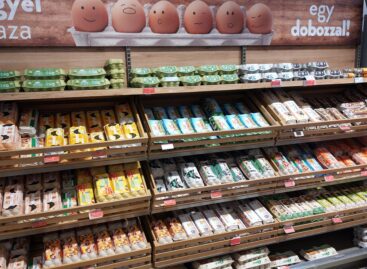Drastic increase in egg prices in Hungary: why do we pay so much for eggs?
In recent years, we have witnessed a drastic increase in Hungarian egg prices, and at the beginning of 2025 there is still no clear sign of relief. While in January 2021, ten eggs cost an average of 442 forints, the same price is now around 930 forints – a price increase of more than 110%, according to the Pénzcentrum.
What is behind the increase in egg prices?
 Although the government is once again blaming retail chains for the increase in food prices, in reality a complex economic process is taking place in the egg market. The most important influencing factors:
Although the government is once again blaming retail chains for the increase in food prices, in reality a complex economic process is taking place in the egg market. The most important influencing factors:
Avian flu epidemic: it has caused huge devastation in egg-producing flocks worldwide.
Weakening of the forint: feed is repriced in euros, which causes further cost increases.
Rise in grain and energy prices: the basic cost factors of production have become more expensive.
US egg crisis: the United States is buying record quantities of eggs worldwide, which is driving up prices.
According to experts at the Pénzcentrum, the biggest impact is the bird flu, which has caused a significant decline in stocks worldwide, thus reducing supply. Increased feed and energy prices have further increased production costs, which is also reflected in consumer prices.
When can the market stabilize?
According to experts, due to the seasonality of bird flu, a retreat is expected in the spring and summer months. At the same time, major players have already taken steps to restock their stocks, which is expected to stabilize the supply and price of eggs by the second half of the year.
However, the further development of energy and grain prices, as well as the stability of the forint exchange rate, is still questionable, so these may also affect the change in egg prices.
The situation of Hungarian consumers
Eggs are one of the basic foods, the price increase of which has a serious impact on Hungarian households. According to forecasts, further price increases are possible as the autumn season approaches, due to the seasonal increase in demand.
In the long term, stabilization is expected to depend mainly on global markets, animal disease developments, and the improvement of the macroeconomic indicators of the Hungarian economy. One thing is certain: the egg market is still extremely volatile, so price fluctuations may continue in the coming months.
Related news
Egg packing house prices increased
🎧 Hallgasd a cikket: Lejátszás Szünet Folytatás Leállítás Nyelv: Auto…
Read more >From caged eggs to alternative production
🎧 Hallgasd a cikket: Lejátszás Szünet Folytatás Leállítás Nyelv: Auto…
Read more >Imported eggs to the EU are booming: Ukraine and the United Kingdom account for the majority
🎧 Hallgasd a cikket: Lejátszás Szünet Folytatás Leállítás Nyelv: Auto…
Read more >Related news
How does the forint exchange rate affect consumer prices?
🎧 Hallgasd a cikket: Lejátszás Szünet Folytatás Leállítás Nyelv: Auto…
Read more >HELL CITY has arrived, led by Michele Morrone
🎧 Hallgasd a cikket: Lejátszás Szünet Folytatás Leállítás Nyelv: Auto…
Read more >Two million people have already voted, so 57 million forints will be given to locals in 125 settlements, courtesy of Tesco
🎧 Hallgasd a cikket: Lejátszás Szünet Folytatás Leállítás Nyelv: Auto…
Read more >








